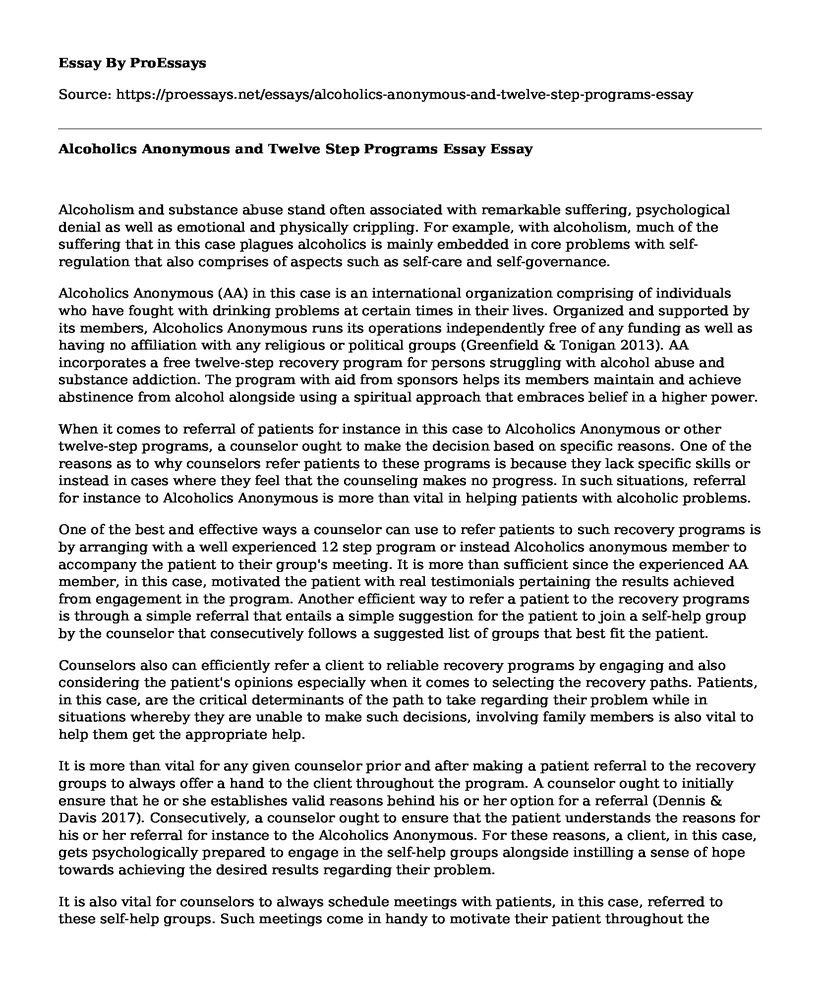Alcoholism and substance abuse stand often associated with remarkable suffering, psychological denial as well as emotional and physically crippling. For example, with alcoholism, much of the suffering that in this case plagues alcoholics is mainly embedded in core problems with self-regulation that also comprises of aspects such as self-care and self-governance.
Alcoholics Anonymous (AA) in this case is an international organization comprising of individuals who have fought with drinking problems at certain times in their lives. Organized and supported by its members, Alcoholics Anonymous runs its operations independently free of any funding as well as having no affiliation with any religious or political groups (Greenfield & Tonigan 2013). AA incorporates a free twelve-step recovery program for persons struggling with alcohol abuse and substance addiction. The program with aid from sponsors helps its members maintain and achieve abstinence from alcohol alongside using a spiritual approach that embraces belief in a higher power.
When it comes to referral of patients for instance in this case to Alcoholics Anonymous or other twelve-step programs, a counselor ought to make the decision based on specific reasons. One of the reasons as to why counselors refer patients to these programs is because they lack specific skills or instead in cases where they feel that the counseling makes no progress. In such situations, referral for instance to Alcoholics Anonymous is more than vital in helping patients with alcoholic problems.
One of the best and effective ways a counselor can use to refer patients to such recovery programs is by arranging with a well experienced 12 step program or instead Alcoholics anonymous member to accompany the patient to their group's meeting. It is more than sufficient since the experienced AA member, in this case, motivated the patient with real testimonials pertaining the results achieved from engagement in the program. Another efficient way to refer a patient to the recovery programs is through a simple referral that entails a simple suggestion for the patient to join a self-help group by the counselor that consecutively follows a suggested list of groups that best fit the patient.
Counselors also can efficiently refer a client to reliable recovery programs by engaging and also considering the patient's opinions especially when it comes to selecting the recovery paths. Patients, in this case, are the critical determinants of the path to take regarding their problem while in situations whereby they are unable to make such decisions, involving family members is also vital to help them get the appropriate help.
It is more than vital for any given counselor prior and after making a patient referral to the recovery groups to always offer a hand to the client throughout the program. A counselor ought to initially ensure that he or she establishes valid reasons behind his or her option for a referral (Dennis & Davis 2017). Consecutively, a counselor ought to ensure that the patient understands the reasons for his or her referral for instance to the Alcoholics Anonymous. For these reasons, a client, in this case, gets psychologically prepared to engage in the self-help groups alongside instilling a sense of hope towards achieving the desired results regarding their problem.
It is also vital for counselors to always schedule meetings with patients, in this case, referred to these self-help groups. Such meetings come in handy to motivate their patient throughout the program an aspect that enhances their success in achieving abstinence from the addiction problems. Scheduling a meeting for the client with a self-help group is another fundamental thing to do since in most cases these patients do not identify with any given recovery programs hence making it necessary to link them up with these program members and leaders. A counselor is also entitled to telling his or her patient what to expect from the recovery program. It is also indispensable for a counselor to provide the patient with various options as well as helping them decide to address both the advantages and disadvantages of making all the possible choices about his or her problem.
References
Connor, J. P., Haber, P. S., & Hall, W. D. (2016). Alcohol use disorders. The Lancet, 387(10022), 988-998.
Dennis, C. B., & Davis, T. D. (2017). Enhancing the referral-making process to 12-step programs: Strategies for social workers. Research on Social Work Practice, 27(4), 423-433.
Greenfield, B. L., & Tonigan, J. S. (2013). The General Alcoholics Anonymous Tools of Recovery: The adoption of 12-step practices and beliefs. Psychology of Addictive Behaviors, 27(3), 553.
Cite this page
Alcoholics Anonymous and Twelve Step Programs Essay. (2022, Mar 29). Retrieved from https://proessays.net/essays/alcoholics-anonymous-and-twelve-step-programs-essay
If you are the original author of this essay and no longer wish to have it published on the ProEssays website, please click below to request its removal:
- Violence Against Women
- Article Analysis Essay on "Canada Should Legalize All Recreational Drugs"
- Critical Essay on Michael Harrington's: The Other America
- Essay Sample on Child Abuse & Neglect: Impact on Well-Being & Health
- Analytical Conclusions: Considering Flaws and Biases - Essay Sample
- Police Force & Ethics: Examining the Issues of Police Brutality - Essay Sample
- Essay Example on Women Gatherers: Uncovering Long-Held Gender Bias in Anthropology







